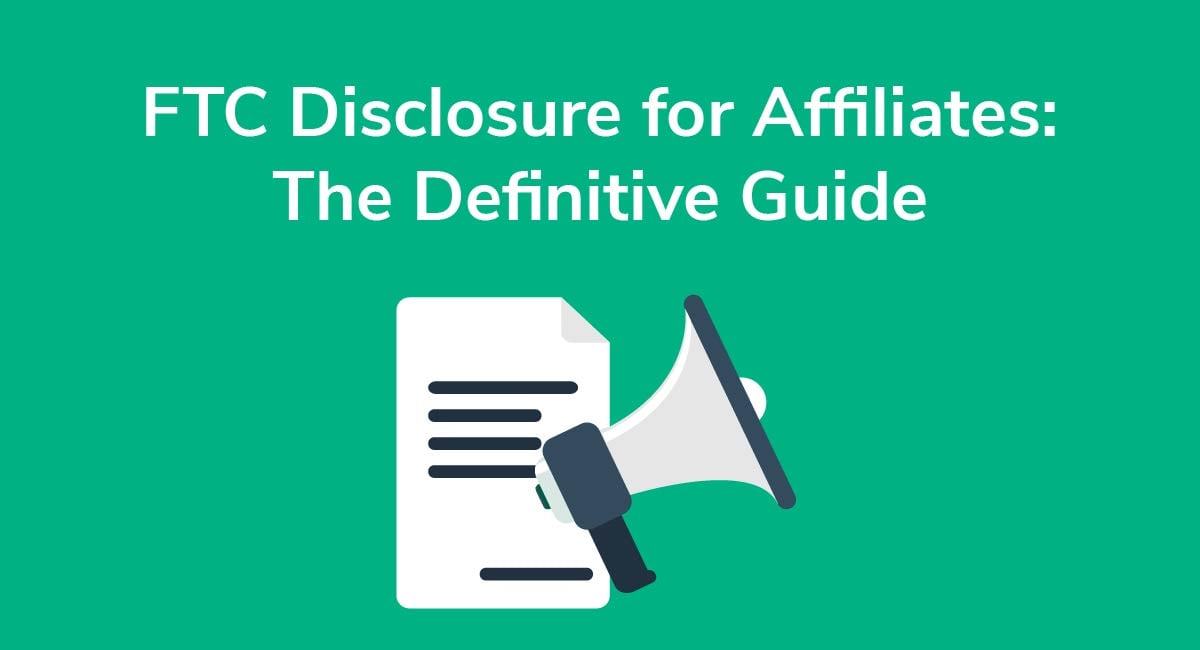All Sales Are Final Policy

An All Sales Are Final Policy is a type of Return and Refund Policy where you inform customers that you do not accept returns or exchanges, except perhaps in limited circumstances or when required by law.
Below, we explore what All Sales Are Final Policies are, what legal implications they carry, and how you can draft and display your own.
Get compliant today with PrivacyPolicies.com
Select one of our generators to create the required legal agreements for your business:
- Our Privacy Policy Generator can help you generate a customized Privacy Policy in around three minutes, for free.
- Our Terms & Conditions Generator can help you generate a customized Terms & Conditions agreement in around three minutes, for free.
- Our EULA Generator can create a customized End-User License Agreement for your mobile or desktop app.
- Our Cookies Policy Generator can create a customized Cookies Policy to help your compliance with ePrivacy Directive and GDPR.
- Our Disclaimer Generator can create a disclaimer or disclosure for your website.
- Our Return & Refund Policy Generator can help your ecommerce store by creating a returns or refunds policy.
Integrate a free Cookies Notice and Cookie Consent banner to comply with the EU ePrivacy Directive and the new GDPR law regarding cookies.
- 1. What is an "All Sales Are Final" Policy?
- 1.1. Are "All Sales Are Final" Policies Legal?
- 2. Pros and Cons of "All Sales Are Final" Policies
- 2.1. The Pros
- 2.2. The Cons
- 3. What Laws Say About "All Sales Are Final" Policies
- 3.1. Australia's Requirements
- 3.2. Canada's Requirements
- 3.3. United States Requirements
- 3.4. U.K.'s Requirements
- 3.5. Other Requirements Around the World
- 4. Tips for Writing Your "All Sales Are Final" Policy
- 5. Displaying Your "All Sales Are Final" Policy
- 6. Key Takeaways
What is an "All Sales Are Final" Policy?
An All Sales Are Final Policy is a notice telling your customers that they can't return certain items for a refund. This policy will be displayed on a company's website so customers or potential customers
Stores commonly use All Sales Are Final Policies if they're selling products which are harder to resell such as custom items, perishable goods, and clearance stock.
Are "All Sales Are Final" Policies Legal?
Unless your country's consumer laws forbid you from having an All Sales Are Final Policy, they are legal.
Even in countries where customers have the legal right to return certain items, they might not have the right to return items just because they change their mind or under other circumstances.
Pros and Cons of "All Sales Are Final" Policies

Every business is unique, so there's no right answer as to whether an All Sales Are Final Policy is right for you. However, here are some pros and cons to consider if you're thinking about having such a policy.
The Pros
With an All Sales Are Final Policy, it's easier to predict your revenue since you won't be worrying about an unpredictable number of returns affecting your profits.
Once an item leaves your warehouse, it's unlikely to be returned, giving you more certainty in terms of tracking and replenishing stock levels.
All Sales Are Final Policies save you money and resources since you won't be wasting so much time processing returns or exchanges.
The Cons
All Sales Are Final Policies are unusual, especially if the policy covers all products. If you're a relatively new business, you could struggle to gain consumers' trust if you have a rigid All Sales Are Final Policy.
Since these policies are less common, your target customers may choose a competitor's products over yours if the terms are fairer.
It might be harder to attract new customers who are unfamiliar with your products e.g. they're unsure how your garment sizing works.
What Laws Say About "All Sales Are Final" Policies

Your All Sales Are Final Policy can be just one or two lines or it can be a longer notice. It all depends on what works for your business. Here are some examples of how you might write your policy to comply with laws across various territories.
Australia's Requirements
According to the Australian Competition & Consumer Commission, Australian customers can't automatically return items just because they change their mind. However, they can return defective products or damaged items, and so it's illegal to refuse all refunds.
If you do decide that sales for some items are final, such as sale stock, your terms must be clear and unequivocal.
YOYA, for example, won't accept refunds for sale items and this is very clear from its Refund Policy:

As a token of goodwill, you might offer to refund certain types of products, such as perishable items, if they are damaged in transit, broken, or unfit for purpose.
The Cupcake Room, for example, won't refund cakes unless they are damaged and unsatisfactory:
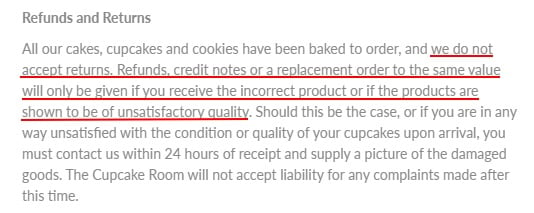
As with the above example, you can set a time limit (in this case, 24 hours) for customers to contact you requesting a refund. Otherwise, you are entitled to refuse the request.
Canada's Requirements
In Canada, it's legal to have an All Sales Are Final Policy. There are no federal laws in place saying you're obliged to accept refunds unless items are defective. However, certain provinces may have laws regarding cooling-off periods or refunds for defective items.
It's good practice to display your terms clearly in your storefront or on your website.
JD Sports, for example, won't accept any returns for final sale items, and this is clear from the company's refund terms under "Returning a Purchase":

If we click on a JD Sports product page for a 50% discounted item, there's a clear "final sale" notice displayed within the description:
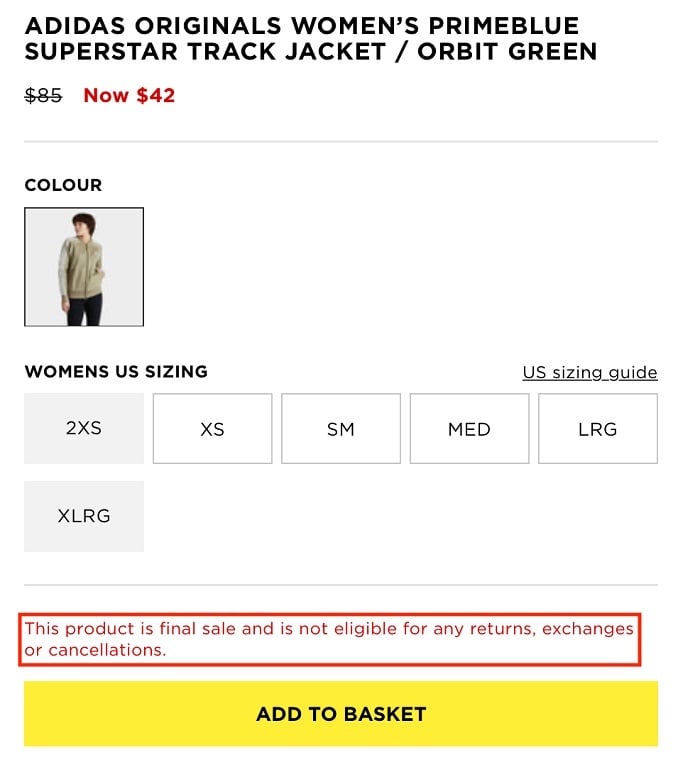
If you're selling in Canada and want an All Sales Are Final Policy, then it's good practice to label individual items as "final sale" so there's no room for confusion.
United States Requirements
You can have an All Sales Are Final Policy in the U.S., although you are still obliged to offer refunds if the goods are defective or you breach the contract in some other way. This is because items are often protected by implied warranties, which mean they should be fit for purpose, so if a product doesn't work properly, it can be returned.
If you opt for an All Sales Are Final Policy, display it clearly where customers can see it.
Devambez, for example, clearly describes its policy as an "All Sales Are Final/Refund Policy":

The company's Refund Policy is very clear, too. It will issue refunds for damaged items, but otherwise, sales are final:

In certain states like California, if you don't display an All Sales Are Final Policy conspicuously like this, then customers can demand a refund regardless of your terms.
U.K.'s Requirements
Similar to Australia, UK customers have certain statutory rights you can't interfere with:
- For items bought in-store, there's no automatic right to a refund unless the store has a Refund Policy that allows customers to return items if they change their mind. Items bought online can be returned within 14 days for any reason.
- UK customers have the legal right to return items which are faulty, unfit for purpose, or not as described.
In the UK, you can declare that some sales are final and that certain items e.g. custom items, opened cosmetics, and perishable items are non-refundable unless faulty or incorrect.
For example, Blondies Kitchen only offers replacement or store credit on incorrect orders. Otherwise, sales are final. This is because the products are baked to order and perishable:
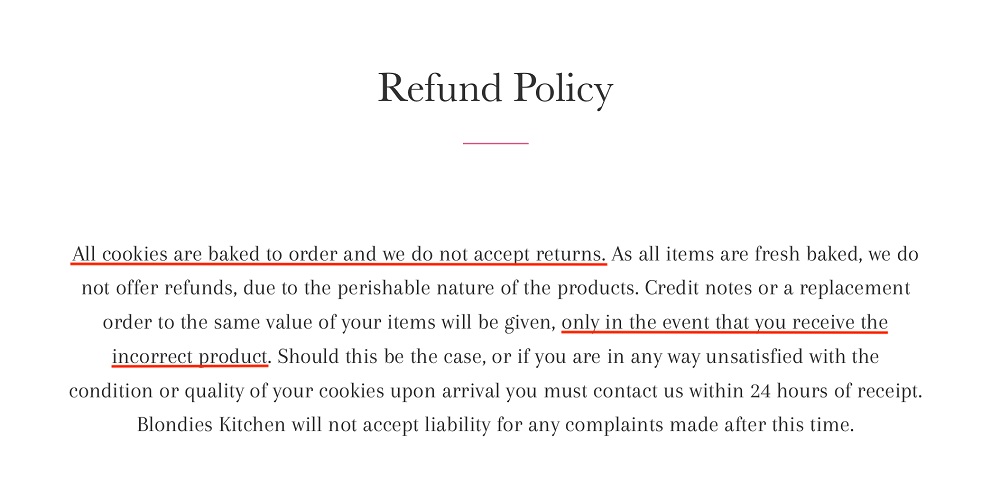
John Lewis, a major retailer, won't accept returns for certain items unless they are faulty:
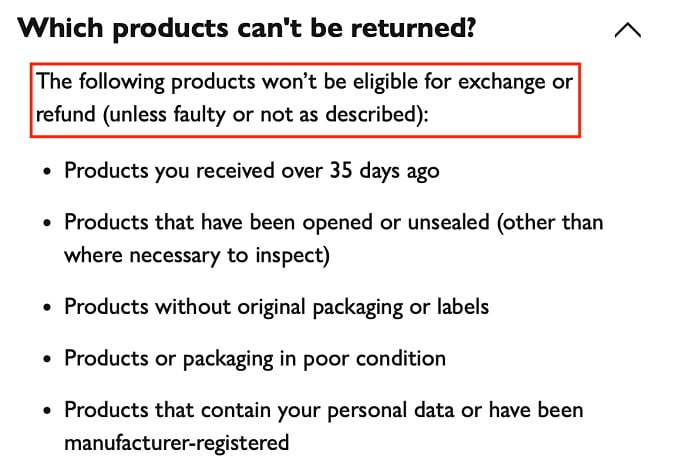
Other Requirements Around the World
Consumer protection laws vary globally. However, here's a brief look at how other territories approach All Sales Are Finally Policies:
- Brazil: Under the Brazilian Consumer Protection Code, customers have the right to return purchases made online or over the telephone within seven days. They can return damaged or faulty goods within a 30-day window.
- China: The Chinese Consumer Law, Article 24 dictates that customers can return items within seven days unless they're opened and perishable i.e. they can't be resold.
- European Union: EU customers have a general right to cancel purchases within 14 days if they have a receipt subject to exceptions e.g. perishable items. They can also return faulty or not-as-described items.
- New Zealand: There's usually no legal right to a refund just because the customer changes their mind. However, customers can return defective or faulty items for a refund under the Consumer Guarantees Act.
It's always worth seeking legal advice if you're unclear how consumer laws in a particular region affect your Refund Policy.
Tips for Writing Your "All Sales Are Final" Policy

Ensure you use short sentences and simple language so your terms are easy for the average person to read and comprehend.
ME BOUTIQUE keeps its terms brief and clear:

You should also minimize the legal jargon where possible even if you're speaking to a more technical audience.
Next, think about whether your All Sales Are Final Policy only applies to certain promotions or events e.g. a summer sale. If this policy only apply to specific products, make sure this is clear from your phrasing.
For example, Swim Outlet customers can't return items marked "Final Sale" such as gift cards and custom clothing:
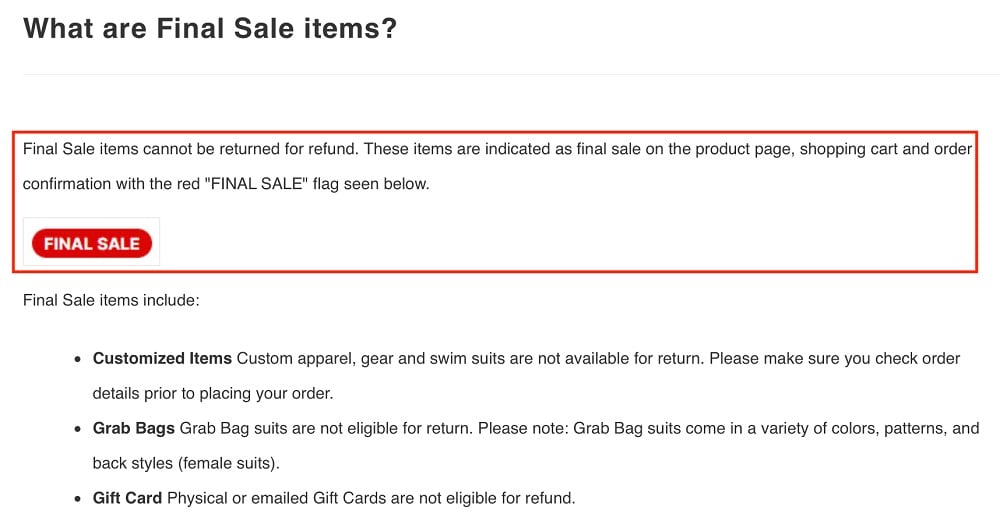
If you're happy to offer exchanges or gift cards rather than a refund, you could include a sentence or two explaining this.
Finally, you might want to add your contact details, such as an email address, so that customers can reach you if they have return or refund questions. While there's no requirement to include contact information, it may give consumers more confidence if they know you're happy to answer questions about your terms and provide any necessary clarity, especially if your policy may seem strict.
Displaying Your "All Sales Are Final" Policy

Make sure you display your All Sales Are Final Policy conspicuously so a customer knows this is your policy before they commit to a purchase.
Displaying your terms conspicuously means placing them somewhere that customers expect to find your legal terms e.g. in your website footer, at checkout, in your shop window, or beside the tills in your store.
Papichulo Style, for example, links to its Refund Policy within its website footer:

There's also a link customers can click to view the terms before they complete the checkout process:

You can also display your All Sales Are Final Policy in your other legal agreements, such as within your Terms and Conditions agreement.
Here's how Swim Outlet includes a Returns clause in its Terms of Use. This clause summarizes some basics about returns, and links the reader to where the complete policy information can be found:
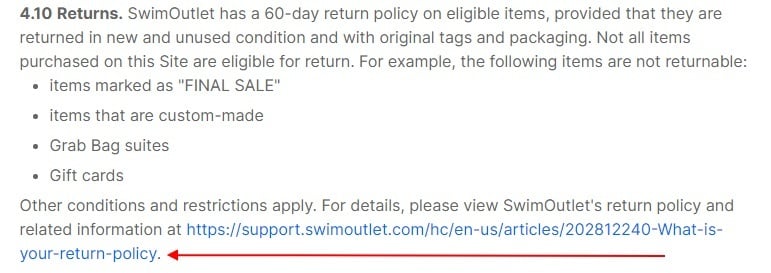
This is a great way to cross-link your policies.
If you don't clearly display your refund terms, especially if they're more restrictive than customers might expect, it's much harder to enforce the policy than if you display your terms somewhere obvious.
Key Takeaways
An All Sales Are Final Policy is a type of Return and Refund Policy that allows you to refuse customer refund requests. Just bear in mind that these policies are not legal in every jurisdiction, so you may need to offer refunds in certain circumstances depending on where you're doing business.
If All Sales Are Final Policies are legal in your territory, then here's a recap of how you might write them effectively:
- Use short, simple language so your customers are in no doubt as to whether you offer refunds.
- Be clear about whether your All Sales Are Final Policy only applies to certain stock, such as sale items, or if it covers every item.
- If you offer exchanges or credit notes rather than refunds, state this clearly.
- Display links to the policy somewhere obvious so customers have ample opportunity to read it before shopping with you.
- Consider including contact details for your business, such as an email address, so potential customers can ask you any questions they may have about your policy before making a purchase.
Even if you can use All Sales Are Final Policies in your region, you might find these policies easier to enforce if you offer exceptions for faulty items or goods which are not as described.
In countries like Australia and the UK, you can state that all sales are final, but this is technically misleading since you must offer refunds if e.g. the product is defective. In such countries, it may be best to offer a restricted Refund Policy rather than an All Sales Are Final Policy to ensure customers understand they have legal rights.
Seek legal advice if you're unsure whether you can have an All Sales Are Final Policy.


